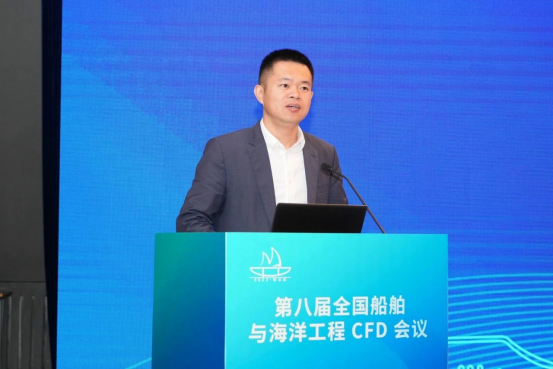The 8th National Conference on Computational Fluid Dynamics (CFD) in Naval Architecture and Ocean Engineering Held in Harbin
From November 11 to 13, 2023, the 8th National Conference on Computational Fluid Dynamics (CFD) in Naval Architecture and Ocean Engineering was held at Harbin Engineering University. Over 430 representatives from universities and institutes participated in the conference, including University of Chinese Academy of Science, Tsinghua University, Northwestern Polytechnical University, Sun Yat-sen University, Hong Kong Polytechnic University, University of Macau, China State Shipbuilding Corporation, etc. They exchanged the latest technological achievements in the application of CFD technology in the fields of naval architecture and ocean engineering This collaborative effort aimed to contribute intellectual insights and collective strength towards the advancement of naval architecture and ocean engineering equipment and technology in China.

Prof. Yin Jingwei introduced the significant achievements that Harbin Engineering University has made in the field of computational fluid dynamics (CFD) in recent years. He hoped that the conference would serve as a platform for collective efforts to advance research in computational fluid dynamics and hydrodynamics in the fields of naval architecture and ocean engineering in China. The goal is to promote the development of fundamental scientific research and interdisciplinary studies.

The conference featured eight thematic sessions, including Numerical and Theoretical Methods in computational fluid dynamics (CFD), Autonomous Software and Industrial Applications, Complex and Biomimetic Flows, Computational Hydrodynamic Scale Modeling, Fluid-Structure Interaction in Marine Structures, Intelligent Fluids and Applications, Multiphase and Cavitation Flows, and Coastal Engineering and Wave Mechanics.
At the conference, there were in total 159 presentations including 7 keynote speeches and 152 session-specific reports. These reports covered a wide range of research areas, including high-efficiency and high-precision algorithms, overall ship performance, fluid-structure interaction, biomimetic design, and the application of artificial intelligence. Industry demands and cutting-edge interdisciplinary challenges in fields such as industrial software, ship engineering, ocean development, and polar exploration have also been addressed.










